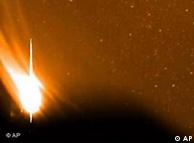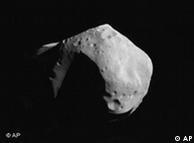Science | 28.06.2008
German Scientists to Hunt Dangerous Asteroids
There are believed to be more than 1,000 asteroids that could slam into the earth and obliterate a city or even a small country. German scientists will develop a satellite to track them in time to prevent catastrophy.
German scientists said this week that they are planning a satellite especially to hunt asteroids that might crash into the earth.
The project is modest by aeronautic standards, estimated at 15 million euros ($24 million). The satellite would scan the space for so-called near earth objects (NEOs). Any celestial body which orbits the sun on a track that crosses the Earth's orbit is considered an NEO.
The German space agency DLR said modeling showed there must be more than 1,000 such objects more than 100 meters (328 feet) wide, but only nine have been discovered so far.
Collision course
 Bildunterschrift: Großansicht des Bildes mit der Bildunterschrift: A piece of an asteroid lit up the skies of southern Spain in 2003
Bildunterschrift: Großansicht des Bildes mit der Bildunterschrift: A piece of an asteroid lit up the skies of southern Spain in 2003
The announcement was made just before the 100th anniversary of an asteroid that exploded over Siberia, destroying 2,000 square kilometers (770 square miles) of forest. The June 30, 1908 Tunguska Event is thought to have been caused by a rock 30 to 50 meters wide.
"It's vital to identify NEOs before they get onto a collision course with the earth," said Ekkehard Kuehrt of the DLR planetary research institute.
Development work on the satellite is scheduled to begin this autumn. The satellite would also track space junk, which consists of satellite debris orbiting the Earth.
DLR says that with sufficient warning time, such as 10 years, an NEO could be nudged away into an orbit that did not threaten the earth. A spacecraft could crash into the NEO and knock off a chunk, leading to a change in the NEO's course.

Comments